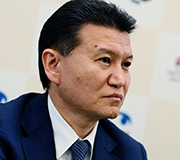My friends advised me to leave Moscow. I was through with Moscow. The only thing that linked me with the city was a temporary registration pass valid until the end of the academic year. The only tie. A small and almost illusive one, but still a tie. My friends were really at a loss as to what else could be done. They wrote solicitous letters trying to help me, but all in vain. My friends could not see any other way out.
"What? You mean you are going to stand up against the KGB, the Foreign Ministry and the Central Party Committee? You are crazy!" my friends argued convincingly. "You'd better leave while it's not too late. Otherwise they will make mince meat out of you. They'll crush you like a mosquito!"
There is a popular saying: "If you've lost a friend it is your hard luck, if you've lost your parents it is a grief, but if you've lost courage then you've lost everything." I was all set to fight to the end. I did not see any other way out and decided to stay.
"It's tantamount to suicide, Kirsan," a friend told me, throwing up his hands.
Still more summons and questioning sessions with the KGB. I often caught my ex-friends ' amazed glances: how come you are still at large? Haven't they shot you yet?
- "Well, perhaps you are not a spy," the lieutenant told me. "But you have entered our grinding-machine and now there is only one way out."
- "What do you mean?"
- "We might be able to help you if you can prove your devotion to your country."
"You mean if l agree to go to Afghanistan, right?"
"Not necessarily. You could a l so be of assistance here." The lieutenant started to talk about the treacherous nature of the foreign intelligence services, the feebleness of our youth and one's duty to one's country. I had already understood what he was driving at.
Seemingly casual, he gave me to understand that requests from the KGB could not be denied. "Incidentally, we consider you r expulsion from the institute and the party to be premature. They are great ones for overdoing things."
The lieutenant paused and looked at me meaningfully. He was waiting for my reaction.
- "Am l supposed to sign something?" I asked .
- "An application." The lieutenant put pencil and paper in front of me.
- "An application..." l started formula ting a sentence aloud as if rehearsing what I was going to write. "You are kindly requested to recruit me as a stool-pigeon. Is that okay? Did I understand you correctly?
- "Oh, come on! That's not the way to phrase it," the lieutenant said wryly. "After all you're a diplomat , aren't you?"
- "But not a stooge." l carefully pushed the paper away from me. Very carefully and very smoothly.
The lieutenant's Adam's apple twitched visibly. We kept silent.
- "As a matter of fact we could help you," he said at last.
- "Are you really in need of stool -pigeons?"
Suddenly l felt free and calm. That was it: I had declared myself. Now come what may! And yet somewhere inside of me the remains of my old fear were quivering. A sickening tremulous fear.
"l am inclined to think you will come to us of your own accord soon," the KGB man said. He had no doubts at al l. He was positive that I would come...
The sun was shining brightly. l was enjoying the smell of exhaust fumes and the sound of the passing cars in the streets. I t felt as though I had not heard all these sounds for years. Freedom. l was free from the doubts and the nervous tension of the past days. I had made my crucial decision. I had passed the test. Many years later, in Tajikistan, an old man said to me: "You know, son, you have been through the kind of trouble that not every fifty-year-old man would be able to endure without cracking. Great is the nation which has such sons." That is how the Tajik sage referred to my people: a great nation .
The temporary registration gave me the right to live in Moscow for a few more months . After that I would have to leave the city. I realized quite clearly that the lieutenant's polite threat was not a joke . Now that I was under surveillance, they could put me in jail for being unemployed, for violating the so called "Passport Regime Act", for crossing a street i n a wrong place. Or else they could have me beaten up by "hoods". They could arrange anything! They had a lot of tricks up their sleeve. I had several months left before my registration expired and I decided to use them to my further struggle. I could not sit and do nothing, but nor did I intend to beat a retreat.
Kirsan Ilyumzhinov
The President's Crown of Thorns 1995
 I remember walking down the corridors of the institute's hostel. I had just been released and was feeling happy and affectionate, enjoying the sweet air of freedom.
I remember walking down the corridors of the institute's hostel. I had just been released and was feeling happy and affectionate, enjoying the sweet air of freedom.






















